Linda C. McCabe's Blog, page 3
February 6, 2013
Forged in Grace by Jordan Rosenfeld
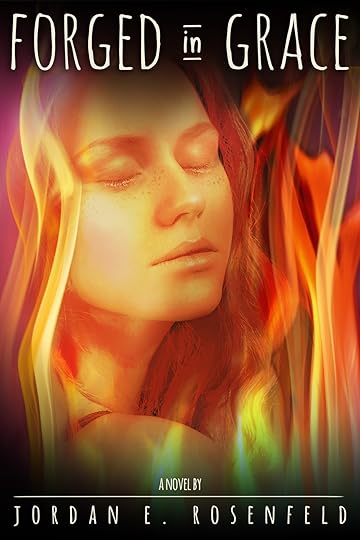
"Jordan E. Rosenfeld’s luminous, edgy debut is dark, searingly-written, and
ultimately redemptive. Forged in Grace startled me at every breathtaking
turn." - Patry Francis, author of The Liar's Diary
My friend Jordan Rosenfeld's debut novel Forged in Grace publication date is February 28th.
Here is a description:
Grace Jensen survived a horrific fire at age 15. The flames changed
her: badly scarred in body and mind, Grace developed an ability to feel
other people’s pain. Unable to bear human touch, she has made a small
life for herself in Northern California, living with her hoarder mother,
tending wounded animals, and falling a little in love with her former
doctor. Her safe world explodes when the magnetic Marly Kennet reappears
in town; Grace falls right back into the dynamic of their complicated
friendship. Marly is the holder of many secrets, including one that has
haunted Grace for over a decade: what really happened the night of the
fire?
When Marly exhorts Grace to join her in Las Vegas, to make up for the
years they have been lost to each other, Grace takes a leap of faith
and goes. Although Marly is not entirely honest about her intentions,
neither woman anticipates that enlarging Grace’s world will magnify her
ability to sense the suffering of others—or that she will begin to heal
wounds by swallowing her own pain and laying her hands on the afflicted.
This gift soon turns darker when the truth of Marly’s life—and the real
reason she ended her friendship with Grace—pushes the boundaries of
loyalty and exposes both women to danger.
FORGED IN GRACE gives a new twist to the idea of reuniting with an
old flame—literally. Exploring ruptured female friendships as in Leah
Stewart’s The Myth of You and Me with the dark psychology (and twist of the inexplicable) found in Donna Tartt’s The Secret History, FORGED IN GRACE will resonate with anyone who has wanted to set the past right.
To help build momentum for the release date, Jordan is highlighting the work of some of her literary friends and offering free copies of their work through daily literary trivia questions.
Today an electronic copy of my novel Quest of the Warrior Maiden will be given away to the first person who correctly answers the trivia question posted on her blog. She also has a Facebook author page you can "like" and a link will appear there as well.
Jordan had been an influential part of the Sonoma County literary scene when I first met her. She had created a literary salon in Petaluma as well as a literary radio program on our local National Public Radio station.
She has moved out of Sonoma County, but her influence is still felt here. Last night an interview with Jordan about her forthcoming novel was aired on KRCB Radio by Gil Mansergh, the new host of "Word by Word." It will be available in a few days as a downloadable podcast from the station's website and through iTunes. (I will add a link once that is put online.)
Jordan has written many articles that have appeared in such publications as Writer's Digest Magazine including a cover story interview with New York Times best selling author Tess Gerritsen. She has several nonfiction books on writing including the wonderful Make a Scene: crafting a powerful story one scene at a time published by Writers Digest Books.

She has returned several times to our county to be a speaker at Redwood Writers meetings and workshops. Here is a photo of her from the 2009 Winter Editing Workshops where she discussed the importance of writing powerful scenes.
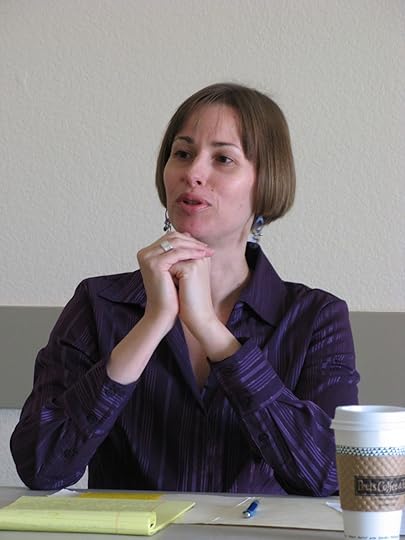
Jordan has not only done her own writing, but is a successful freelance editor. I am one of her many satisfied clients in that regard.
One more thing I wanted to mention is that Jordan also teaches online writing classes with lessons and assignments to bring out the best in your writing. She has a Revise for Publication class starting February 18th. So if your New Year's Resolution was to shape up your NaNoWriMo manuscript into something publishable - consider this as Opportunity Knocking on your front door.
I wish Jordan well in the launch of her novel. Bonne chance mon ami!
http://lcmccabe.blogspot.com/2013/02/...

Published on February 06, 2013 22:47
February 3, 2013
Dos and Don'ts of Public Speaking
This blog post is intended for writers who are given the opportunity to read portions of their work aloud. However, others who have to speak in front of an audience may also find some of the suggestions to be helpful.
I have over thirty years public speaking experience. In high school I was a member of our championship forensics team and was an award winning competitive public speaker in the Serious Interpretation category. This advice is the product of my experience as well as my frustration when I have witnessed public readings I have found to be embarrassing.
1. Do know your time limits and plan for them. If you have a short time frame to work with, say five minutes, select a passage that fits within those parameters including any prefatory comments you need to make to set up the scene for the audience. Time yourself. If it goes long, consider choosing another passage or perhaps change your beginning or ending places so that it fits in the time frame.
2. Don't Ramble or waste time. I have been to a few open microphone sessions where a writer is one of several speakers, but once they have the mic it seems as if s/he will not relinquish it without a big hook coming out and taking him/her off the stage. I particularly hate it when people ramble, because it demonstrates they were not prepared.
If you are given five minutes to speak, that five minutes starts from
the time you are given the floor or handed the microphone. Rambling for four minutes before you start reading does not mean you still get to read for an additional five minutes. Nope. If you are given five minutes, you
have five minutes. Especially if you are sharing a stage with others. That means that there will be members of the audience who came specifically to hear someone else speak. If you go over your time limit, (by more than a minute or two), you will be cutting into others' time or causing the program to go long.
Recently I saw an author bring her book to the stage, but her opening was not a statement used to set up her reading. Instead she rambled on and on about her life. She spent her entire time speaking without any discernable purpose, used up her entire time and never read a single word from her book. It became nothing more than a prop she waved in the air.
A different example of wasting time was when I delivered an academic paper at an international conference. I was one of three speakers in a session and I was given the last speaking slot. We were all to have an equal twenty minutes to present. However, the first speaker was a college professor who had not timed his presentation until the night before. He became irritated about the brevity and felt this time constraint caused him to eviscerate the heart and soul out of his talk. He complained about this. Repeatedly. Not just to the panel moderator in private, but during his talk.
He took time during his speech to complain that he did not have enough time. He probably spent a total of three minutes during his talk saying, "oh I cannot go into more detail about that because I do not have enough time."
He also ignored the moderator when she told him that his time was over, and continued speaking for a few more minutes. This cut into the time left for my presentation. I was professional about it and was able to condense and speed up some of my presentation so the session did not run overtime.
3. Do make a script that is easy to read. One of my pet peeves is authors reading from their physical books. I think it is fine to read directly from a book if it is a picture book where the pages are read and shown to an adoring crowd of children. Otherwise, it is often awkward for someone to read directly from a bound book. Not only do you have to fight with the binding, losing your place if it closes, but the font is generally not large enough to read with ease.
If you are reading your own story, then make a script off of documents you have on your hard drive.
Boost the font. Make it 18 or 20 point. Make it bold. Whatever works best for you to read without difficulty.
Print it out, and make it so that your paragraphs do not have widows or orphans. It is best to read to the end of a paragraph and then turn the page. Number your pages.
My personal preference is to put the printed pages onto construction paper. This makes it a script where the pages can be changed with ease. I find this easier to use than plain paper with a staple on the top. I also find myself being distracted from the reading by concentrating at the stapled copy in a reader's hand to assess how many more pages they are going to read. A script with separate pages will remove that distraction.
4. Don't think that reading glasses will make reading from a physical book easy to do in public.
It will not. Wearing reading glasses while trying to read from a physical book will make you have to look down more often. This will hurt your performance. As your head is turned downward, your voice will be focused downward. Or your throat will be at an acute angle and this will change the tone of your voice and your ability to project your words. Alternately, you could hold the book upward so that your neck is straight and your voice is projected well. This will also cause the book to cover your face making it hard for your audience to see your facial expressions or to have any eye contact with them.
5. Do entertain your audience. Express yourself in a manner that will captivate your audience's attention. If you are reading passages with dialogue, create different voices to help them understand and follow who is speaking. Use eye contact to engage the audience with you. Having rehearsed your talk enough times and having an easy to read script will allow you to look up and at your audience.
Remember, if you are sharing the stage with others then many in the audience will be there in support of other speakers. They may know nothing about you. Make them sit up and take notice of your performance. Make them feel as if they discovered someone new to admire.
6. Don't bore your audience. Rambling at the beginning of your talk is lethal for grabbing and maintaining an audience's attention. Once lost it is hard to get back.
Fumbling with a book and reading glasses as well as speaking in a monotone is also high risk behavior for losing your audience.
Whether you realize it or not, you are competing for all of the audience members' attentions. Make it worth their while to pay attention to you and not make a mental list of errands that need running or check their email on their iPhone. They could be other places right now, but they are chose to spend a portion of their lives at whatever venue you are speaking. They could change their mind at any moment and leave to go to the bathroom or go home.
7. Do your best to be heard. It is frustrating when a speaker does not project his or her voice well enough to be heard or does not know how to properly use a microphone. If someone objects when you start speaking and says, "I can't hear you!" make sure that the situation is resolved before you continue with your planned talk. This may mean readjusting the microphone to being closer to your mouth or forcing yourself to SPEAK UP!
8. Don't think you do not need amplification. I have seen speakers at a podium decide they did not want to use the microphone that is provided. Even after someone in the audience complained. Most of the time speakers are mistaken when they think their voice is loud enough without amplification to be heard in all corners of the room. I only knew one woman who could pull that off with ease, because She Could Project. Loudly. When she chose to project her voice, it was as if she used a megaphone. She was the proverbial exception that proves the rule.
I remember a sad case of a female politician who had become feeble in her old age. She was a guest speaker at an event and when it came time for her to speak, she could not make herself heard by using the microphone. It had worked fine for all the speakers before her, but it seemed as if it stopped working when she took the stage. People scrambled to find a replacement microphone, they tested it and then handed it to her. We were all hopeful this would resolve the problem. She took the microphone and then it became clear that her anemic vocal performance was not due to technology, but due to her inability to perform anymore.
This was heartbreaking for me, because I had looked forward to hearing her talk and knew she had a wealth of knowledge and a lifetime of experience that was worthy of hearing. I stopped straining to make out her words, and instead accepted that I could not hear her unless I was standing next to her onstage.
--
Here is an example of a recent public speaking appearance where I read a passage from my novel. You can see how I used a script, varied my voice to entertain the audience, tried to use eye contact and did my best to be heard over the ambient conversation of those in the restaurant who were not there for the literary event.
I was the only participant to stay in the 5-7 minute time frame mentioned at the beginning of the event. (The video running time is just over seven minutes, but that includes the introduction given to me before I started speaking.)
If there are any other pieces of advice in public speaking that I did not mention, but you think should be included in this list - please leave it in the comment section. Thank you and I hope this advice is helpful.
http://lcmccabe.blogspot.com/2013/02/...

I have over thirty years public speaking experience. In high school I was a member of our championship forensics team and was an award winning competitive public speaker in the Serious Interpretation category. This advice is the product of my experience as well as my frustration when I have witnessed public readings I have found to be embarrassing.
1. Do know your time limits and plan for them. If you have a short time frame to work with, say five minutes, select a passage that fits within those parameters including any prefatory comments you need to make to set up the scene for the audience. Time yourself. If it goes long, consider choosing another passage or perhaps change your beginning or ending places so that it fits in the time frame.
2. Don't Ramble or waste time. I have been to a few open microphone sessions where a writer is one of several speakers, but once they have the mic it seems as if s/he will not relinquish it without a big hook coming out and taking him/her off the stage. I particularly hate it when people ramble, because it demonstrates they were not prepared.
If you are given five minutes to speak, that five minutes starts from
the time you are given the floor or handed the microphone. Rambling for four minutes before you start reading does not mean you still get to read for an additional five minutes. Nope. If you are given five minutes, you
have five minutes. Especially if you are sharing a stage with others. That means that there will be members of the audience who came specifically to hear someone else speak. If you go over your time limit, (by more than a minute or two), you will be cutting into others' time or causing the program to go long.
Recently I saw an author bring her book to the stage, but her opening was not a statement used to set up her reading. Instead she rambled on and on about her life. She spent her entire time speaking without any discernable purpose, used up her entire time and never read a single word from her book. It became nothing more than a prop she waved in the air.
A different example of wasting time was when I delivered an academic paper at an international conference. I was one of three speakers in a session and I was given the last speaking slot. We were all to have an equal twenty minutes to present. However, the first speaker was a college professor who had not timed his presentation until the night before. He became irritated about the brevity and felt this time constraint caused him to eviscerate the heart and soul out of his talk. He complained about this. Repeatedly. Not just to the panel moderator in private, but during his talk.
He took time during his speech to complain that he did not have enough time. He probably spent a total of three minutes during his talk saying, "oh I cannot go into more detail about that because I do not have enough time."
He also ignored the moderator when she told him that his time was over, and continued speaking for a few more minutes. This cut into the time left for my presentation. I was professional about it and was able to condense and speed up some of my presentation so the session did not run overtime.
3. Do make a script that is easy to read. One of my pet peeves is authors reading from their physical books. I think it is fine to read directly from a book if it is a picture book where the pages are read and shown to an adoring crowd of children. Otherwise, it is often awkward for someone to read directly from a bound book. Not only do you have to fight with the binding, losing your place if it closes, but the font is generally not large enough to read with ease.
If you are reading your own story, then make a script off of documents you have on your hard drive.
Boost the font. Make it 18 or 20 point. Make it bold. Whatever works best for you to read without difficulty.
Print it out, and make it so that your paragraphs do not have widows or orphans. It is best to read to the end of a paragraph and then turn the page. Number your pages.
My personal preference is to put the printed pages onto construction paper. This makes it a script where the pages can be changed with ease. I find this easier to use than plain paper with a staple on the top. I also find myself being distracted from the reading by concentrating at the stapled copy in a reader's hand to assess how many more pages they are going to read. A script with separate pages will remove that distraction.
4. Don't think that reading glasses will make reading from a physical book easy to do in public.
It will not. Wearing reading glasses while trying to read from a physical book will make you have to look down more often. This will hurt your performance. As your head is turned downward, your voice will be focused downward. Or your throat will be at an acute angle and this will change the tone of your voice and your ability to project your words. Alternately, you could hold the book upward so that your neck is straight and your voice is projected well. This will also cause the book to cover your face making it hard for your audience to see your facial expressions or to have any eye contact with them.
5. Do entertain your audience. Express yourself in a manner that will captivate your audience's attention. If you are reading passages with dialogue, create different voices to help them understand and follow who is speaking. Use eye contact to engage the audience with you. Having rehearsed your talk enough times and having an easy to read script will allow you to look up and at your audience.
Remember, if you are sharing the stage with others then many in the audience will be there in support of other speakers. They may know nothing about you. Make them sit up and take notice of your performance. Make them feel as if they discovered someone new to admire.
6. Don't bore your audience. Rambling at the beginning of your talk is lethal for grabbing and maintaining an audience's attention. Once lost it is hard to get back.
Fumbling with a book and reading glasses as well as speaking in a monotone is also high risk behavior for losing your audience.
Whether you realize it or not, you are competing for all of the audience members' attentions. Make it worth their while to pay attention to you and not make a mental list of errands that need running or check their email on their iPhone. They could be other places right now, but they are chose to spend a portion of their lives at whatever venue you are speaking. They could change their mind at any moment and leave to go to the bathroom or go home.
7. Do your best to be heard. It is frustrating when a speaker does not project his or her voice well enough to be heard or does not know how to properly use a microphone. If someone objects when you start speaking and says, "I can't hear you!" make sure that the situation is resolved before you continue with your planned talk. This may mean readjusting the microphone to being closer to your mouth or forcing yourself to SPEAK UP!
8. Don't think you do not need amplification. I have seen speakers at a podium decide they did not want to use the microphone that is provided. Even after someone in the audience complained. Most of the time speakers are mistaken when they think their voice is loud enough without amplification to be heard in all corners of the room. I only knew one woman who could pull that off with ease, because She Could Project. Loudly. When she chose to project her voice, it was as if she used a megaphone. She was the proverbial exception that proves the rule.
I remember a sad case of a female politician who had become feeble in her old age. She was a guest speaker at an event and when it came time for her to speak, she could not make herself heard by using the microphone. It had worked fine for all the speakers before her, but it seemed as if it stopped working when she took the stage. People scrambled to find a replacement microphone, they tested it and then handed it to her. We were all hopeful this would resolve the problem. She took the microphone and then it became clear that her anemic vocal performance was not due to technology, but due to her inability to perform anymore.
This was heartbreaking for me, because I had looked forward to hearing her talk and knew she had a wealth of knowledge and a lifetime of experience that was worthy of hearing. I stopped straining to make out her words, and instead accepted that I could not hear her unless I was standing next to her onstage.
--
Here is an example of a recent public speaking appearance where I read a passage from my novel. You can see how I used a script, varied my voice to entertain the audience, tried to use eye contact and did my best to be heard over the ambient conversation of those in the restaurant who were not there for the literary event.
I was the only participant to stay in the 5-7 minute time frame mentioned at the beginning of the event. (The video running time is just over seven minutes, but that includes the introduction given to me before I started speaking.)
If there are any other pieces of advice in public speaking that I did not mention, but you think should be included in this list - please leave it in the comment section. Thank you and I hope this advice is helpful.
http://lcmccabe.blogspot.com/2013/02/...

Published on February 03, 2013 10:57
January 27, 2013
Charlemagne died January 28th 814
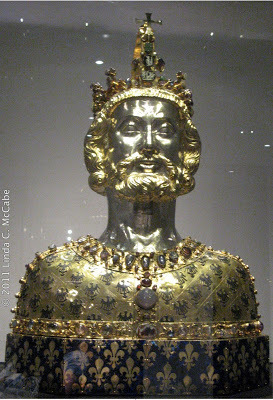
A reliquary of Charlemagne containing his head. This is found in the cathedral treasury in Aachen, Germany.
In honor of the 1199th anniversary of Charlemagne's death, and in anticipation of the major anniversary to be celebrated next year, I wanted to write a post in honor of that historic leader who changed Europe.
His date of birth is reported as April 2nd, but the year is in some dispute. Encyclopedia Britannica has it listed as 747? while his official biographer Einhardt suggests he died at age 72 making his birth year as 742. There is not any dispute as to when he died.
I have snapped pictures associated with Charlemagne ever since beaming a devotee of Carolingian legends.
I wanted to share some of them with my blog readers.
Staring in Paris, there is a statue of him in front of Notre Dame Cathedral.
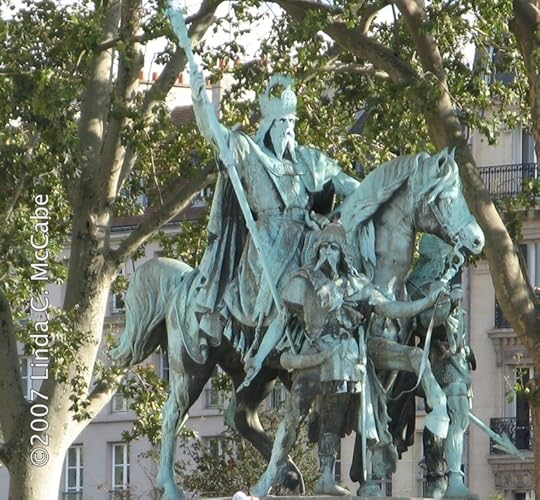
Then on the Right Bank is Rue Charlemagne.
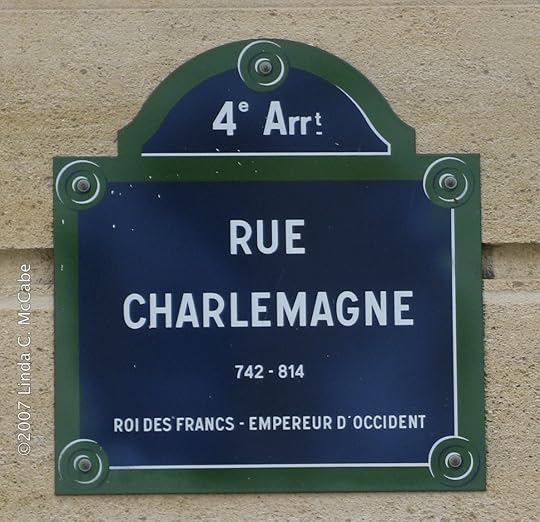
I was delighted to find that his street intersected with one named after his biographer, Rue Eginhard.
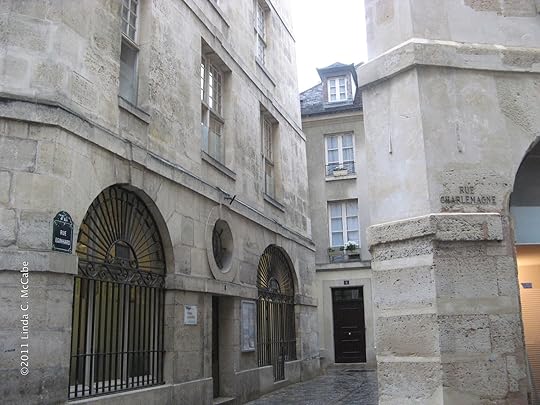
There was also a bookstore named after him a few blocks away.
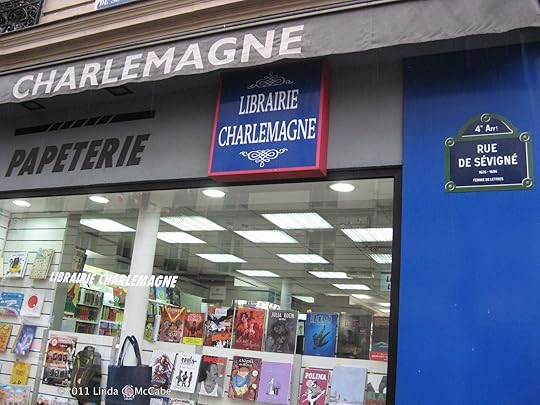
Not far from the Musée Carnavalet is a street named after the famous poem Les Quatre Fils Aymon.
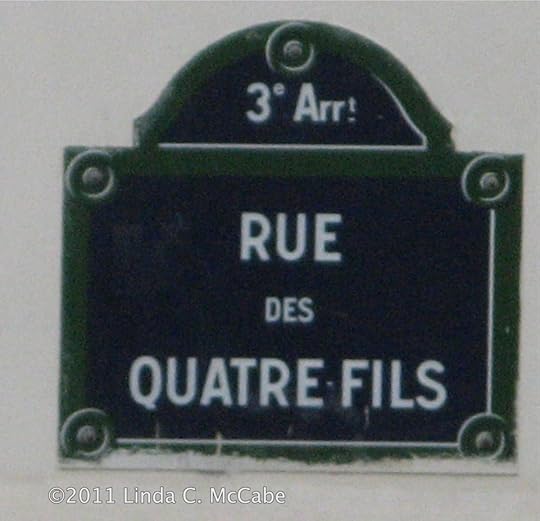
Then in Chantilly, a chateau north of Paris I found a painting depicting those four sons of Aymon riding on the back of Renaud de Montauban's coveted destrier Bayard.
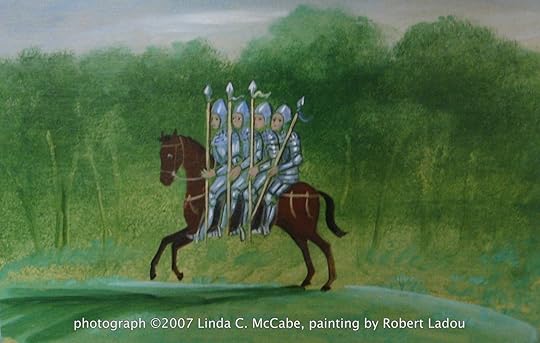
Too bad the artist did not have Renaud sporting Mambino's golden helmet. Then we would know for certain which of the four brothers was Renaud.
In the Louvre you can find not only a reliquary containing one of Charlemagne's arms,
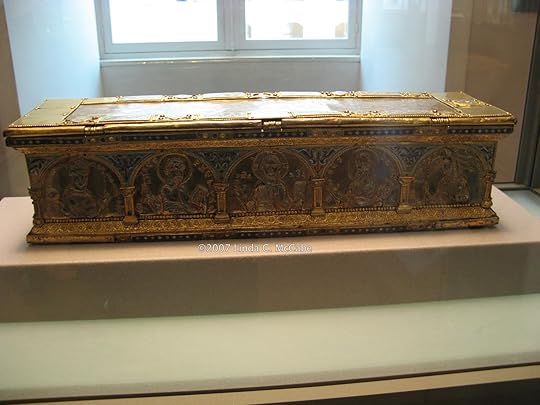
but a replica of his famous sword Joyeuse.
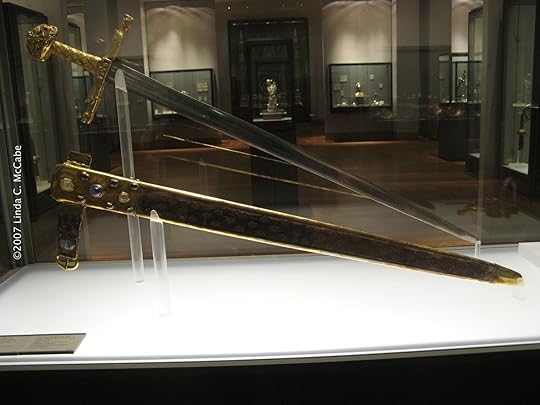
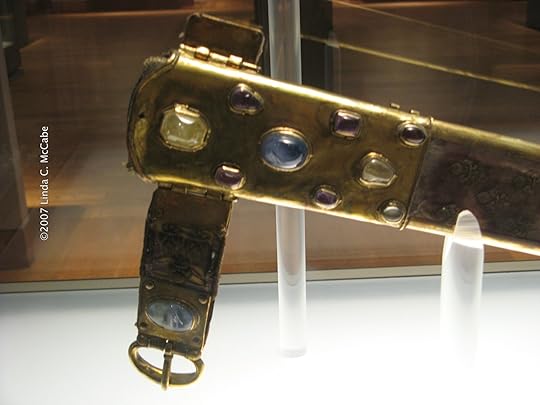
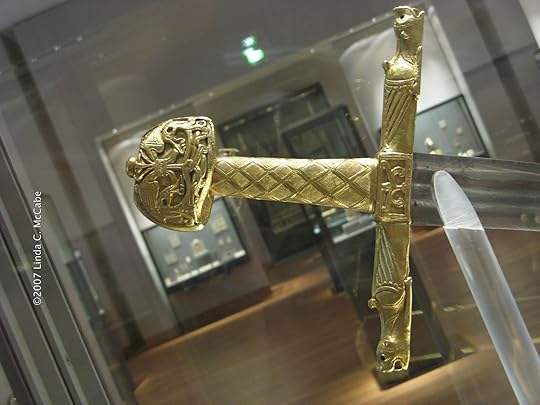
While in Amboise, I noticed Rue Joyeuse.
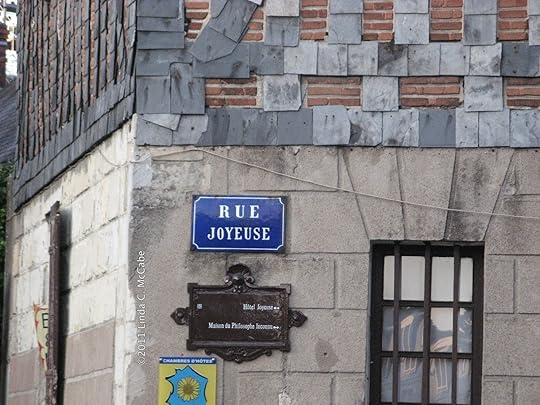
In Reims, the treasury for the cathedral had a statue of Charlemagne that had been taken down because it has deteriorated and needs a replacement.
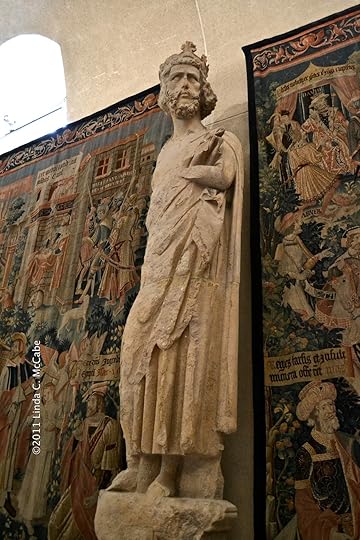
Here is a closer look.
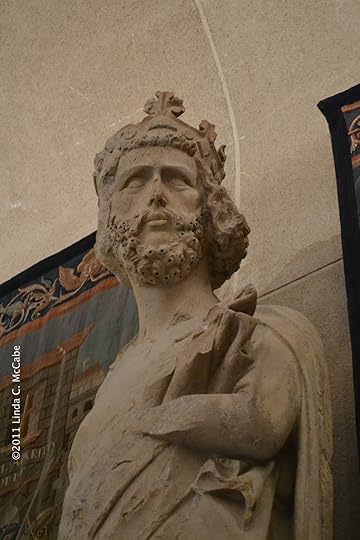
Here I am providing perspective as to its size. Plus, I wanted a picture taken of me with Charlemagne.
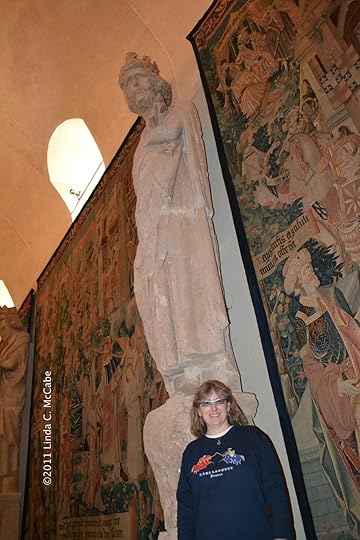
Here is where I believe it had been placed on the cathedral. You can see the empty pedestal.

It is not so obvious when you look at the cathedral as a whole.
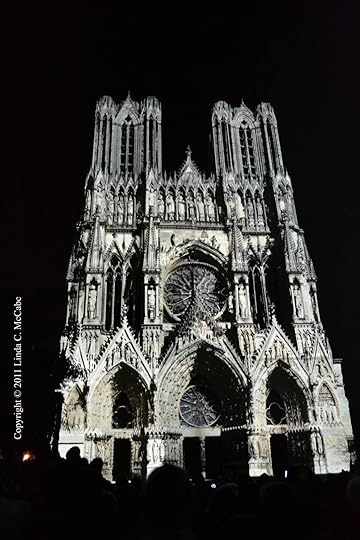
Speaking of cathedrals, there is an entire stained glass window devoted to the legends of Charlemagne at the cathedral in Chartres.
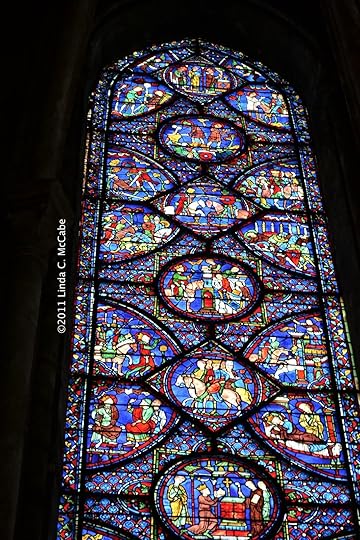
If you are wondering how someone can tell that this window is about Charlemagne and not just any king, you can see if you look closely the word Carolus used in many of these insets.
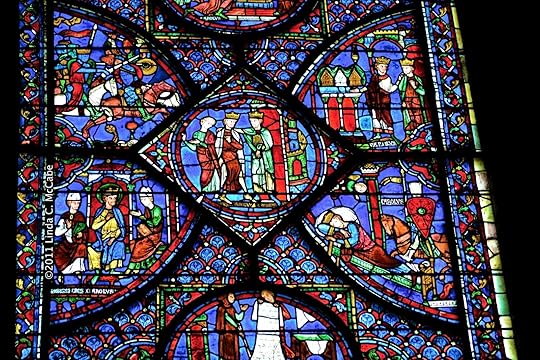
During a trip to Italy in 2011, I arranged a tour of St. Peter's Basilica because I wanted to see where Charlemagne had been crowned as emperor of the Western Roman Empire on Christmas Day in the year 800.
Outside the entrance to St. Peter's stands a large statue of Charlemagne.
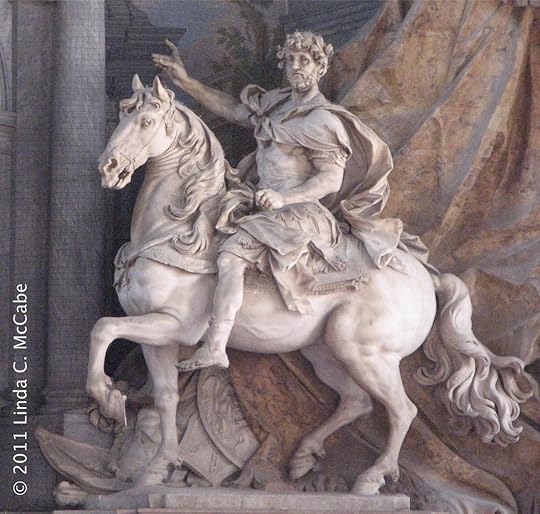
There is a companion statue of Constantine facing Charlemagne, but I never even looked his way. So I do not have a picture of that to share.
Inside the basilica, my tour guide showed me the very spot Charlemagne was crowned. It was upon a disk of red porphyry.
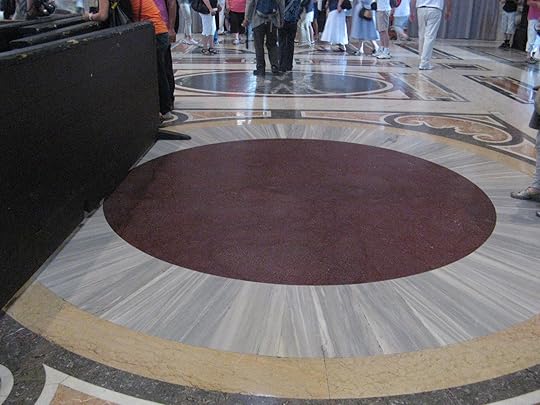
My guide stressed that red porphyry was expensive and had been mined from a single mine in Egypt, but had been long since been exhausted. This made the existing porphyry all the more valuable.
I then started taking pictures of red porphyry where ever I saw it.
Here is one in the Roman Pantheon.
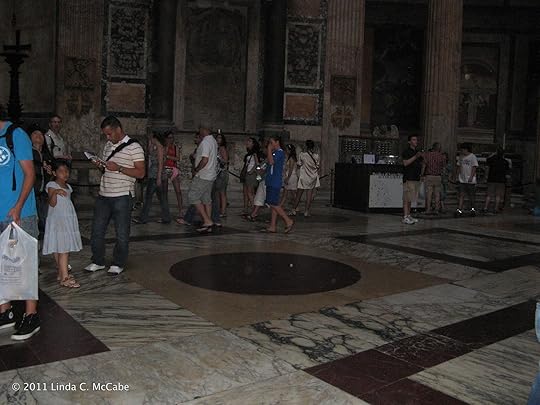
And a close up of that disk.
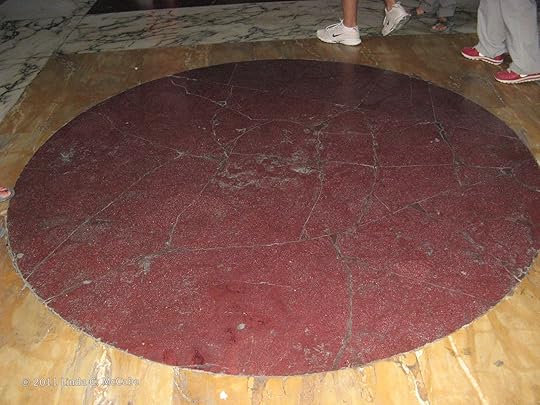
Then in August 2011, I visited Aachen. The capital of Charlemagne's empire.
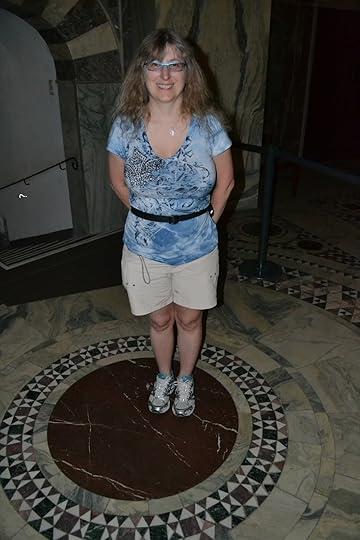
This time when I saw a disk of red porphyry inside his cathedral, I made sure to have my picture taken standing on it.
Here is his throne which was on the second floor in the cathedral. There are steps leading up to the throne and pilgrims used to crawl under it.
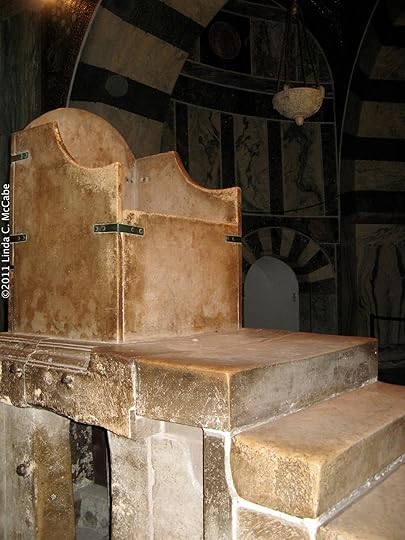
Here is a replica of his crown that is in the Rathause, a building where the current Aachen City Council meets and where Charlemagne's palace once stood.
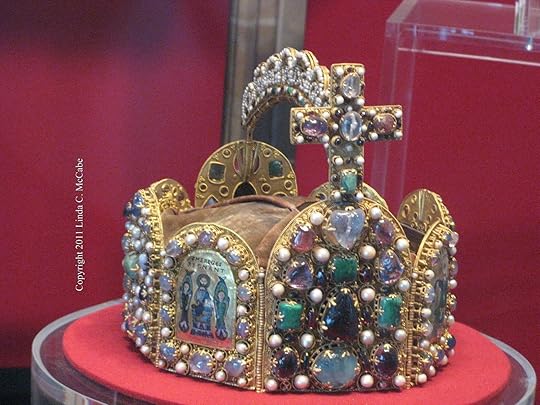
He was originally buried in this sarcophagus that is now housed in the cathedral treasury.
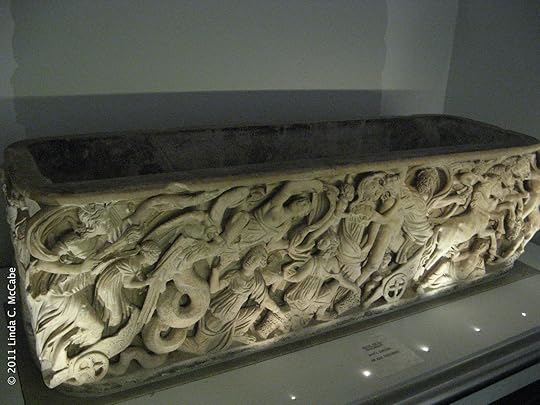
However, when he was canonized, they removed his remains and placed several portions in small reliquaries (like the golden head at the top of this page and the arm held in the Louvre) and the bulk of his bones inside a golden reliquary inside his cathedral.
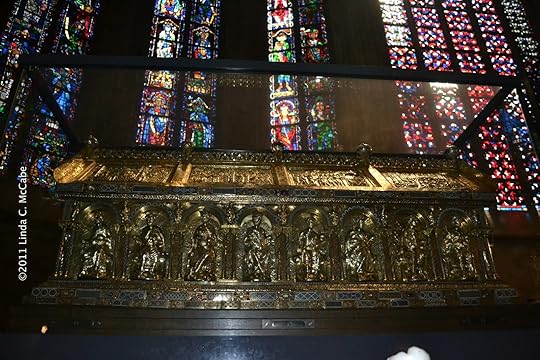
In Aachen, Charlemagne's influence can be found everywhere. Including his monogram found on the streets.
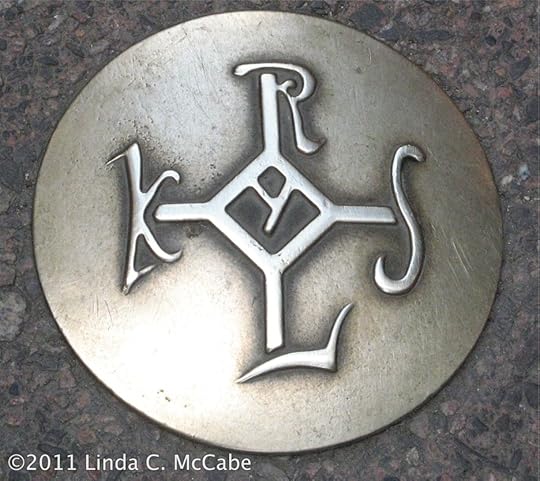
I hope to make it back to visit Aachen next year and see some of the festivities planned for such a significant anniversary of the death of an important leader in history. Perhaps I will be lucky to be asked to participate as an author whose work's purpose is to inspire a new generation to discover and enjoy the legends of Charlemagne.

Published on January 27, 2013 15:40
January 23, 2013
The Next Big Thing Blog Hop
The Next Big Thing Blog Hop is a viral campaign to help bring awareness to writers and their works in progress and hopefully find new fans to their work.
My friend Erika Mailman posted her answers last week to these same ten questions about her forthcoming novel House of Bellaver and tagged me and Ann Marie Myers for this week.
1. What is the working title of your book?
Fate of the Saracen Knight: volume two in the Bradamante and Ruggiero series
2. Where did the idea for the book come from?
Recently I wrote an entire blog post on this subject about my participation in the online Harry Potter fandom debates (back when the series was incomplete). I began researching the symbolic meaning of hippogriffs. That led me to read the epic poem Orlando furioso.
I was amazed to discover an intricate tale of medieval knights in battle, and was drawn to one storyline in particular that featured a warrior maiden in love with a virtuous knight who was on the opposite side of a holy war. Part 2 of this answer will be finished in Question #9.
3. What genre does your book come under?
Epic historic fantasy or Carolingian legend.
4. Which actors would you choose to play your characters in a movie rendition?
My hero Ruggiero needs to be young and handsome. I like the idea of Ruggiero being played by Ben Barnes, best known for his role as Prince Caspian in the Chronicles of Narnia films. Here is a publicity still from that movie.

For my heroine, I would love to have Jennifer Lawrence play the part of Bradamante. Her
portrayal of Katniss Everdeen in the Hunger Games movies demonstrates
the strong and determined nature of Bradamante as well as her beauty. The character is also tall, and Jennifer Lawrence is about 5'8" a good height to play the role.

<!--
/* Font Definitions */
@font-face
{font-family:Times;
panose-1:2 0 5 0 0 0 0 0 0 0;
mso-font-charset:0;
mso-generic-font-family:auto;
mso-font-pitch:variable;
mso-font-signature:3 0 0 0 1 0;}
@font-face
{font-family:"Lucida Grande";
panose-1:2 11 5 3 3 4 4 4 2 4;
mso-font-charset:0;
mso-generic-font-family:auto;
mso-font-pitch:variable;
mso-font-signature:3 0 0 0 1 0;}
/* Style Definitions */
p.MsoNormal, li.MsoNormal, div.MsoNormal
{mso-style-name:"Normal\,SMW Normal hanging";
mso-style-parent:"";
margin-top:0in;
margin-right:0in;
margin-bottom:6.0pt;
margin-left:0in;
text-indent:.3in;
mso-pagination:widow-orphan;
font-size:12.0pt;
mso-bidi-font-size:10.0pt;
font-family:"Times New Roman";
mso-fareast-font-family:"Lucida Grande";
mso-bidi-font-family:"Times New Roman";}
p
{margin:0in;
margin-bottom:.0001pt;
mso-pagination:widow-orphan;
font-size:10.0pt;
font-family:"Times New Roman";
mso-ascii-font-family:Times;
mso-fareast-font-family:"Lucida Grande";
mso-hansi-font-family:Times;
mso-bidi-font-family:"Times New Roman";}
@page Section1
{size:8.5in 11.0in;
margin:1.0in 1.25in 1.0in 1.25in;
mso-header-margin:.5in;
mso-footer-margin:.5in;
mso-paper-source:0;}
div.Section1
{page:Section1;}
</style>
</td></tr>
</tbody></table>
-->
<br />
<div style="margin: 0.1pt 0in;">
<span style="font-size: xx-small;">©Harper Smith</span></div>
<div style="margin: 0.1pt 0in;">
<span style="font-size: xx-small;"><a href="http://www.facebook.com/JenniferLawrence" target="_blank">From Jennifer La<span style="font-size: xx-small;">wrence's Facebook page</span></a><span style="font-size: xx-small;"> Consider this a<span style="font-size: xx-small;">nother <span style="font-size: xx-small;">share.</span></span></span> </span></div>
<br />
I do not want to spend too much time discussing other characters and respective actors, but there is one in particular I must mention. The famous Frankish warrior Orlando, I imagine being played by<b> </b>the popular French rugby player Sebastien Chabal. Perhaps once his rugby career is finally over, he will consider becoming an actor. He would be convincing as a ferocious Frankish warrior.<br />
<br />
<div class="separator" style="clear: both; text-align: center;">
<a href="http://2.bp.blogspot.com/-dAhVf7BVHPk..." imageanchor="1" style="margin-left: 1em; margin-right: 1em;"><img border="0" height="239" src="http://2.bp.blogspot.com/-dAhVf7BVHPk..." width="320" /></a></div>
<br />
<b> </b><br />
<br />
<b>5. What is the one-sentence synopsis of your book?</b><br />
<br />
Ruggiero has two different prophecies of divergent fates and dueling magical forces attempting to influence which one will come to pass.<br />
<br />
Now to elaborate a little and discuss his two different potential fates: <br />
<br />
He will either convert to Christianity, marry Bradamante, sire a line of heroes with her, but die tragically before the birth of his son OR he will remain a Muslim, bring about the defeat of Charlemagne<b> </b>and the fall of the Frankish Empire which will devastate Christendom. <b><br /></b><br />
<br />
<b>6. Is your book self-published, published by an independent publisher, or represented by an agency?</b><br />
<br />
Volume one was published by a small boutique publisher. Volume two will be as well.<br />
<br />
<b>7. How long did it take you to write the first draft of your manuscript?</b><br />
<br />
Yikes, still going on writing the first draft of the sequel. Volume one was finished in one year, but it took me another five years to edit/wordsmith/finish obsessing over it.<br />
<b> </b><br />
<b>8. What other books would you compare this story to within your genre?</b><br />
<br />
A friend of mine suggested that my story reminded her of George R.R. Martin's Song of Ice and Fire series. I believe that is because both series are complex with a large cast of characters, interweaving plot threads, and multiple POVs. The tone in my novels is far different in that I strive to have a heroic classical style rather than Martin's grittiness. Comparatively I also have far fewer characters than he does.<br />
<br />
<br />
This Bradamante and Ruggiero series is based on the legends of Charlemagne which are not all that well known today. It should appeal to fans of Arthurian legends. The source material is just as luxurious as <i>Le Morte d'Arthur</i>, but there is the added benefit that most people will not know what to expect next in the story.<br />
<b> </b><br />
<b> </b><br />
<b>9. Who or what inspired you to write this book?</b><br />
<br />
Part 2 of Question 2. I was captivated by the tale of impossible love between Bradamante and Ruggiero. <b> </b>While reading <i>Orlando furioso</i>, I kept asking myself why I had never heard of this incredible warrior maiden. I was astounded that a man wrote such a strong heroine back in the 16th century. I was also impressed by the depth of the love between Bradamante and Ruggiero was staggering, and the sacrifices they were willing to make for each other.<br />
<br />
I remember reading the climax of the story and having tears run down my face as I sat on the patio during my lunch break. If a story can bring tears to my face while I read in a public place, it is something worthwhile.<br />
<br />
I decided that I should not complain about the character of Bradamante in literature not being widely known. Instead, I would spend my time, talent and energy into adapting this story into one that is accessible for modern audiences.<br />
<br />
<b>10. What else about your book might pique the reader's interest?</b><br />
<br />
<i>Orlando furioso</i> was originally published in 1516, so we are nearing the 500th anniversary of its publication.<b> </b><br />
<b><br /></b>
It was popular in its day and Ludovico Ariosto is still looked at as one of Italy's most famous poets.<i> </i><br />
<br />
Queen Elizabeth I discovered that John Harrington had translated a passage for the amusement of some ladies in her court. It was a bawdy passage, and Queen Elizabeth commanded him to leave the court and not return until he had translated the entire poem. So that is how the first English translation came about.<br />
<br />
<br />
<br />
<div class="separator" style="clear: both; text-align: center;">
<br /></div>
People might be interested in hearing me read from my current novel, the first volume in the series. I was recently interviewed on a local National Public Radio affiliate and the interview is now available as <a href="https://itunes.apple.com/us/podcast/j..." target="_blank">an iTunes download</a>. The host led me on a fun chat about fantasy writing, medievalism, chivalry, as well as prompted me to read several passages.<br />
<br />
I am also uploading a video to Youtube of a reading at a Wine and Dine with Authors event from last night. It is currently uploaded on <a href="http://www.facebook.com/photo.php?v=2..." target="_blank">my novel's official Facebook page</a> and I will embed the Youtube version here later once it has finished loading.<br />
<br />
<div class="separator" style="clear: both; text-align: center;">
<br /></div>
<iframe width="560" height="315" src="http://www.youtube.com/embed/YPEsAlehosA" frameborder="0" allowfullscreen></iframe>
<br />
<b>Now to tag next week's participant on this great viral experiment:</b><br />
<br />
<b><a href="http://foulmouthedbard.blogspot.com/" target="_blank">Rob Loughran</a>, a prolific writer of novels and joke books. </b><br />
<br />
<br />
<br />
<br />
<a href="http://lcmccabe.blogspot.com/2013/01/... </i><br />
<b> </b><br />
<b><br /></b><img src="http://feeds.feedburner.com/~r/blogsp..." height="1" width="1"/>
My friend Erika Mailman posted her answers last week to these same ten questions about her forthcoming novel House of Bellaver and tagged me and Ann Marie Myers for this week.
1. What is the working title of your book?
Fate of the Saracen Knight: volume two in the Bradamante and Ruggiero series
2. Where did the idea for the book come from?
Recently I wrote an entire blog post on this subject about my participation in the online Harry Potter fandom debates (back when the series was incomplete). I began researching the symbolic meaning of hippogriffs. That led me to read the epic poem Orlando furioso.
I was amazed to discover an intricate tale of medieval knights in battle, and was drawn to one storyline in particular that featured a warrior maiden in love with a virtuous knight who was on the opposite side of a holy war. Part 2 of this answer will be finished in Question #9.
3. What genre does your book come under?
Epic historic fantasy or Carolingian legend.
4. Which actors would you choose to play your characters in a movie rendition?
My hero Ruggiero needs to be young and handsome. I like the idea of Ruggiero being played by Ben Barnes, best known for his role as Prince Caspian in the Chronicles of Narnia films. Here is a publicity still from that movie.

For my heroine, I would love to have Jennifer Lawrence play the part of Bradamante. Her
portrayal of Katniss Everdeen in the Hunger Games movies demonstrates
the strong and determined nature of Bradamante as well as her beauty. The character is also tall, and Jennifer Lawrence is about 5'8" a good height to play the role.

<!--
/* Font Definitions */
@font-face
{font-family:Times;
panose-1:2 0 5 0 0 0 0 0 0 0;
mso-font-charset:0;
mso-generic-font-family:auto;
mso-font-pitch:variable;
mso-font-signature:3 0 0 0 1 0;}
@font-face
{font-family:"Lucida Grande";
panose-1:2 11 5 3 3 4 4 4 2 4;
mso-font-charset:0;
mso-generic-font-family:auto;
mso-font-pitch:variable;
mso-font-signature:3 0 0 0 1 0;}
/* Style Definitions */
p.MsoNormal, li.MsoNormal, div.MsoNormal
{mso-style-name:"Normal\,SMW Normal hanging";
mso-style-parent:"";
margin-top:0in;
margin-right:0in;
margin-bottom:6.0pt;
margin-left:0in;
text-indent:.3in;
mso-pagination:widow-orphan;
font-size:12.0pt;
mso-bidi-font-size:10.0pt;
font-family:"Times New Roman";
mso-fareast-font-family:"Lucida Grande";
mso-bidi-font-family:"Times New Roman";}
p
{margin:0in;
margin-bottom:.0001pt;
mso-pagination:widow-orphan;
font-size:10.0pt;
font-family:"Times New Roman";
mso-ascii-font-family:Times;
mso-fareast-font-family:"Lucida Grande";
mso-hansi-font-family:Times;
mso-bidi-font-family:"Times New Roman";}
@page Section1
{size:8.5in 11.0in;
margin:1.0in 1.25in 1.0in 1.25in;
mso-header-margin:.5in;
mso-footer-margin:.5in;
mso-paper-source:0;}
div.Section1
{page:Section1;}
</style>
</td></tr>
</tbody></table>
-->
<br />
<div style="margin: 0.1pt 0in;">
<span style="font-size: xx-small;">©Harper Smith</span></div>
<div style="margin: 0.1pt 0in;">
<span style="font-size: xx-small;"><a href="http://www.facebook.com/JenniferLawrence" target="_blank">From Jennifer La<span style="font-size: xx-small;">wrence's Facebook page</span></a><span style="font-size: xx-small;"> Consider this a<span style="font-size: xx-small;">nother <span style="font-size: xx-small;">share.</span></span></span> </span></div>
<br />
I do not want to spend too much time discussing other characters and respective actors, but there is one in particular I must mention. The famous Frankish warrior Orlando, I imagine being played by<b> </b>the popular French rugby player Sebastien Chabal. Perhaps once his rugby career is finally over, he will consider becoming an actor. He would be convincing as a ferocious Frankish warrior.<br />
<br />
<div class="separator" style="clear: both; text-align: center;">
<a href="http://2.bp.blogspot.com/-dAhVf7BVHPk..." imageanchor="1" style="margin-left: 1em; margin-right: 1em;"><img border="0" height="239" src="http://2.bp.blogspot.com/-dAhVf7BVHPk..." width="320" /></a></div>
<br />
<b> </b><br />
<br />
<b>5. What is the one-sentence synopsis of your book?</b><br />
<br />
Ruggiero has two different prophecies of divergent fates and dueling magical forces attempting to influence which one will come to pass.<br />
<br />
Now to elaborate a little and discuss his two different potential fates: <br />
<br />
He will either convert to Christianity, marry Bradamante, sire a line of heroes with her, but die tragically before the birth of his son OR he will remain a Muslim, bring about the defeat of Charlemagne<b> </b>and the fall of the Frankish Empire which will devastate Christendom. <b><br /></b><br />
<br />
<b>6. Is your book self-published, published by an independent publisher, or represented by an agency?</b><br />
<br />
Volume one was published by a small boutique publisher. Volume two will be as well.<br />
<br />
<b>7. How long did it take you to write the first draft of your manuscript?</b><br />
<br />
Yikes, still going on writing the first draft of the sequel. Volume one was finished in one year, but it took me another five years to edit/wordsmith/finish obsessing over it.<br />
<b> </b><br />
<b>8. What other books would you compare this story to within your genre?</b><br />
<br />
A friend of mine suggested that my story reminded her of George R.R. Martin's Song of Ice and Fire series. I believe that is because both series are complex with a large cast of characters, interweaving plot threads, and multiple POVs. The tone in my novels is far different in that I strive to have a heroic classical style rather than Martin's grittiness. Comparatively I also have far fewer characters than he does.<br />
<br />
<br />
This Bradamante and Ruggiero series is based on the legends of Charlemagne which are not all that well known today. It should appeal to fans of Arthurian legends. The source material is just as luxurious as <i>Le Morte d'Arthur</i>, but there is the added benefit that most people will not know what to expect next in the story.<br />
<b> </b><br />
<b> </b><br />
<b>9. Who or what inspired you to write this book?</b><br />
<br />
Part 2 of Question 2. I was captivated by the tale of impossible love between Bradamante and Ruggiero. <b> </b>While reading <i>Orlando furioso</i>, I kept asking myself why I had never heard of this incredible warrior maiden. I was astounded that a man wrote such a strong heroine back in the 16th century. I was also impressed by the depth of the love between Bradamante and Ruggiero was staggering, and the sacrifices they were willing to make for each other.<br />
<br />
I remember reading the climax of the story and having tears run down my face as I sat on the patio during my lunch break. If a story can bring tears to my face while I read in a public place, it is something worthwhile.<br />
<br />
I decided that I should not complain about the character of Bradamante in literature not being widely known. Instead, I would spend my time, talent and energy into adapting this story into one that is accessible for modern audiences.<br />
<br />
<b>10. What else about your book might pique the reader's interest?</b><br />
<br />
<i>Orlando furioso</i> was originally published in 1516, so we are nearing the 500th anniversary of its publication.<b> </b><br />
<b><br /></b>
It was popular in its day and Ludovico Ariosto is still looked at as one of Italy's most famous poets.<i> </i><br />
<br />
Queen Elizabeth I discovered that John Harrington had translated a passage for the amusement of some ladies in her court. It was a bawdy passage, and Queen Elizabeth commanded him to leave the court and not return until he had translated the entire poem. So that is how the first English translation came about.<br />
<br />
<br />
<br />
<div class="separator" style="clear: both; text-align: center;">
<br /></div>
People might be interested in hearing me read from my current novel, the first volume in the series. I was recently interviewed on a local National Public Radio affiliate and the interview is now available as <a href="https://itunes.apple.com/us/podcast/j..." target="_blank">an iTunes download</a>. The host led me on a fun chat about fantasy writing, medievalism, chivalry, as well as prompted me to read several passages.<br />
<br />
I am also uploading a video to Youtube of a reading at a Wine and Dine with Authors event from last night. It is currently uploaded on <a href="http://www.facebook.com/photo.php?v=2..." target="_blank">my novel's official Facebook page</a> and I will embed the Youtube version here later once it has finished loading.<br />
<br />
<div class="separator" style="clear: both; text-align: center;">
<br /></div>
<iframe width="560" height="315" src="http://www.youtube.com/embed/YPEsAlehosA" frameborder="0" allowfullscreen></iframe>
<br />
<b>Now to tag next week's participant on this great viral experiment:</b><br />
<br />
<b><a href="http://foulmouthedbard.blogspot.com/" target="_blank">Rob Loughran</a>, a prolific writer of novels and joke books. </b><br />
<br />
<br />
<br />
<br />
<a href="http://lcmccabe.blogspot.com/2013/01/... </i><br />
<b> </b><br />
<b><br /></b><img src="http://feeds.feedburner.com/~r/blogsp..." height="1" width="1"/>
Published on January 23, 2013 05:34
January 8, 2013
The English Bookshop in Milan, Italy

Peter Panton's English Bookshop in Milan, Italy
I have been meaning on writing this post for quite some time now. With a new year, comes a fresh determination to spend more time posting to my blog.
In June of 2011, I was fortunate enough to spend a week in Italy. I was accompanying my husband on a business trip in Milan and Rome. We did not have much advance notice of this trip, but we did our best to make the most of our time while there.
On a Tuesday morning, while my husband was giving his business lecture, I was free to explore Milan by myself. I was on a mission to find anything that had to do with Ludovico Ariosto and his epic poem Orlando furioso.
I was happy to discover there was a street named Via Ariosto. While looking on the Streetwise Map of Milan, I saw a listing on that street of a store named The English Bookshop. Going on the internet, I found a website dedicated to English language bookstores in Europe called the Bookstore Guide and their listing for that store. It was scheduled to open at 9:30 am, so I made my way to Via Ariosto with the intent of not only taking pictures of anything with Ariosto's name on it, but exploring the bookstore.
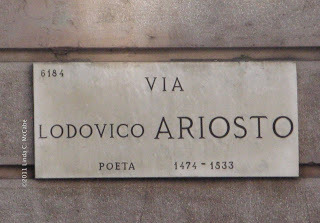
I was pleased to find several different styles of road markers.
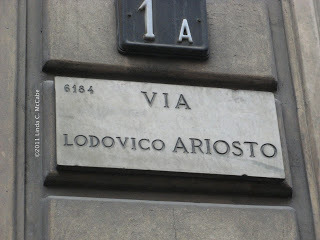
This is my favorite of the markers.

Via Arisoto is a beautiful street with houses such as this lining it.

Imagine living in such a mansion in Italy.
I arrived at the bookstore shortly after it opened and introduced myself to the owner, a British gentleman by the name of Peter Panton. I had a lovely chat with him about writing, bookstores, and what it is like living in Italy. As I suspected, he had read Orlando furioso. I would have thought it almost a requirement for a bookstore owner on a street named for a famous poet to read the poet's work.
Several customers came in during the time I was there and I watched him converse with them in fluent Italian. His having lived in Italy for several decades, being fluent in their language would also be a necessity.

Peter Panton
Here is a description of the bookstore from the official Facebook page of Panton's English Bookshop:
Panton’s two-floor English bookshop, established since 1978, stocks over
60,000 titles and covers a wide variety of interests including:
fiction, history, travel, children’s books, cookery books, art, cinema,
theatre, poetry, biography, illustrated books, best-sellers, antiquarian
books, as well as ELT, travel guides, maps, multimedia, software and
hardware, DVDs and CD-ROMS. Mail-orders are welcome.
Panton’s is
Milan’s first all English bookshop and lives up to its name with a
characteristic British-style decor, a well-informed and helpful staff
and a general warm and very friendly atmosphere.
The hours of operation are:
Mon: 3:30 pm - 7:30 pm
Tue - Sat: 9:30 am - 1:00 pm, 3:30 pm - 7:30 pm
Ah yes, the European custom of closing a business during lunchtime and on Sundays. That is not something that happens often in the United States, but perhaps we ought to do it more often. It is a civilizing influence.
The address for the bookshop is actually 12 Via L. Mascheroni, but the store's front door is on Via Ariosto.
Here is a
I will concur that the store has an English flair to it. I was drawn to the prominent image on the wall of a knight in repose. I tried taking several snapshots of it, this was the one with the least glare and the most color.
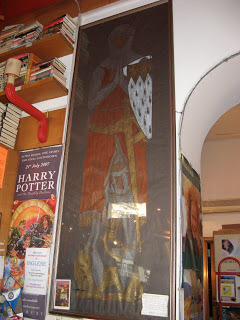
An etching made from atop a gravestone.
Here is another picture of the bookstore from the outside and if you look closely you can see the street marker of Via Ariosto above the store's signage.
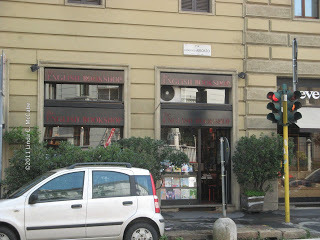
There is even a video showing the inside of Panton's English
Bookshop and highlighting his dog. I don't recall seeing the pooch in
the store, but perhaps I was just so captivated with our discussion
about writing and books, that I forgot about his furry companion.
In the video, the dog appears to be as friendly as his owner.
I tried uploading this video before using Blogger and it didn't work well. Here is a link, just in case.
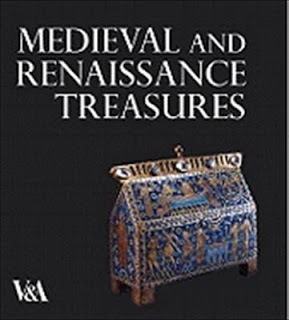
I even purchased a copy of the book Medieval and Renaissance Treasures from the Victoria and Albert Museum. It is hard for me to walk out of a bookstore with only one book, but I try to follow the edict of traveling light and a suitcase full of books can get quite heavy.
I hope that anyone who visits Milan takes the time to stop by Peter Panton's charming
bookstore.
Note: there is another bookstore with a similar name and
there might be some confusion. The other one is the American Bookstore
and it is across from the Sforza Castle. I visited there as well, but I
found the selection was generally travel guides and mass market
paperbacks that you could find in any airport.
There
was not the same sense of community and belonging. A large part of that
is because one is in the heart of the tourist traffic and the other is
in a neighborhood.
I much prefer places with character.
http://lcmccabe.blogspot.com/2013/01/...

Published on January 08, 2013 21:51
January 6, 2013
Changing the focus of my blog
Hello everyone,
I have been considering for a long time a change in the focus of my blog.
Particularly the title of my blog. I have decided to change from "Musings from a L.O.O.N." which reflected my influences from the Harry Potter fandom to what it has become which is now "Legends of Medieval France and Italy."
I will still reserve the right to write blog posts about anything else that moves me to want to share it with a larger audience, such as book or movie reviews, but the main focus is on medievalism, travel, and writing about medievalism and travel. Especially when it comes to the legends of Charlemagne.
I would also like to highlight the availability to hear an interview that was broadcast recently on my local public radio station. KRCB Radio has now made that interview available online as a podcast, both from their website and as a download from iTunes.
Here is the description of the talk:
The description of the talk:
Linda C. McCabe's historical novel Quest of the Warrior Maiden propels an entertaining conversation filled with blood, lust, fantastic adventure, and chivalrous romance.
Linda and host Gil Mansergh gab about those thrilling days of
yesteryear when Charlemagne battled Saracen armies, sword-wielding
knights Bradamante and Ruggiero fell in love at first sight, hippogriffs
swooped in to carry one lover away to an enchanted island populated
with seductive women, while his true love lopped off heads by the score
with a swipe from her broadsword.
--
Gil asked me to read several passages from my novel and several people contacted me to tell me how much they enjoyed my dramatic interpretation.
I have been working to record the story as an audio book, but it will still be many months before that is ready.
So in the meantime, I hope you enjoy the interview and the sample taste of my reading style.
Linda
http://lcmccabe.blogspot.com/2013/01/...

I have been considering for a long time a change in the focus of my blog.
Particularly the title of my blog. I have decided to change from "Musings from a L.O.O.N." which reflected my influences from the Harry Potter fandom to what it has become which is now "Legends of Medieval France and Italy."
I will still reserve the right to write blog posts about anything else that moves me to want to share it with a larger audience, such as book or movie reviews, but the main focus is on medievalism, travel, and writing about medievalism and travel. Especially when it comes to the legends of Charlemagne.
I would also like to highlight the availability to hear an interview that was broadcast recently on my local public radio station. KRCB Radio has now made that interview available online as a podcast, both from their website and as a download from iTunes.
Here is the description of the talk:
The description of the talk:
Linda C. McCabe's historical novel Quest of the Warrior Maiden propels an entertaining conversation filled with blood, lust, fantastic adventure, and chivalrous romance.
Linda and host Gil Mansergh gab about those thrilling days of
yesteryear when Charlemagne battled Saracen armies, sword-wielding
knights Bradamante and Ruggiero fell in love at first sight, hippogriffs
swooped in to carry one lover away to an enchanted island populated
with seductive women, while his true love lopped off heads by the score
with a swipe from her broadsword.
--
Gil asked me to read several passages from my novel and several people contacted me to tell me how much they enjoyed my dramatic interpretation.
I have been working to record the story as an audio book, but it will still be many months before that is ready.
So in the meantime, I hope you enjoy the interview and the sample taste of my reading style.
Linda
http://lcmccabe.blogspot.com/2013/01/...

Published on January 06, 2013 12:21
December 26, 2012
Ebook Promotion - 99 cents for a limited time
I have a few announcements to make:
1) I wanted to announce a promotion for the ebook version of my novel. It is at the bargain price of only 99 cents. This is perfect for those who just received an ereader as a gift this holiday season and are looking to stock their cybershelves with books.
(It will have a comparable discount in BPS and Euros for my international friends.)
Simply go to https://www.smashwords.com/books/view/232697 and enter the coupon code XR43S at checkout.
It has multiple versions that work with Kindles, Nooks, iPads as
well as Android tablets and smart phones. Just choose the one for your
style of e-toy or personal computer.
The promotion ends at midnight Pacific Standard Time (PST) on January 1, 2013. Hurry, and tell your friends.
2) The following day, Wednesday, January 2nd, at 7 pm PST, I will be interviewed on KRCB Radio by Gil Mansergh about my novel and various aspects of writing historical fiction. The interview was taped last week, so I can tell you that I read several passages from the story. If you have ever wondered what my voice sounded like, here is your chance.
You can listen to it live on your computer, but it will also be archived later as a downloadable podcast a few days later. I will put a link to that interview on my blog once it is available.
3) I started a Facebook page for my novel. You can find a link to it on the upper right hand margin of my blog or click this link: Quest of the Warrior Maiden Facebook page.
Please "Like" my page. I plan on uploading many of the pictures I took on my two research trips to France. So far I have three albums that include pictures from Ancient Paris, the Medieval Walls of Paris and a side trip I took to Aachen, Germany, the capital of Charlemagne's Frankish Empire. Here is a small taste of what you will see there already.

Aachen Cathedral
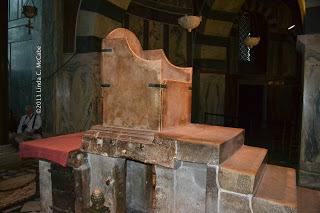
Charlemagne's throne on the second floor of Aachen Cathedral

The golden reliquary that houses most of Charlemagne's remains inside Aachen Cathedral.

A close up of that golden reliquary.
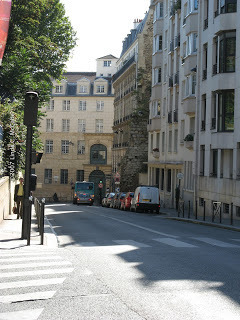
The remaining remants of the medieval walls that once surrounded Paris.
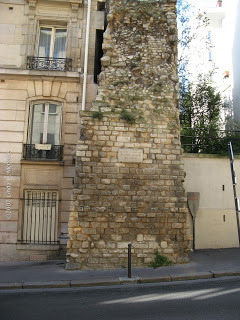
Here is a side view of the wall with an historical marker affixed on its side.
I hope you enjoy those pictures and please spread the word about the promotional price on the ebook version of my novel and my novel's Facebook page. If you have friends who are Medievalists, tell them about my page so they can see some marvelous photographs.
If you would also like to be Facebook friends with me, just mention in a message that you read my blog. Otherwise, it feels strange getting friend requests from people I don't know.
Thanks and may everyone have a safe and happy new year!
http://lcmccabe.blogspot.com/2012/12/...
1) I wanted to announce a promotion for the ebook version of my novel. It is at the bargain price of only 99 cents. This is perfect for those who just received an ereader as a gift this holiday season and are looking to stock their cybershelves with books.
(It will have a comparable discount in BPS and Euros for my international friends.)
Simply go to https://www.smashwords.com/books/view/232697 and enter the coupon code XR43S at checkout.
It has multiple versions that work with Kindles, Nooks, iPads as
well as Android tablets and smart phones. Just choose the one for your
style of e-toy or personal computer.
The promotion ends at midnight Pacific Standard Time (PST) on January 1, 2013. Hurry, and tell your friends.
2) The following day, Wednesday, January 2nd, at 7 pm PST, I will be interviewed on KRCB Radio by Gil Mansergh about my novel and various aspects of writing historical fiction. The interview was taped last week, so I can tell you that I read several passages from the story. If you have ever wondered what my voice sounded like, here is your chance.
You can listen to it live on your computer, but it will also be archived later as a downloadable podcast a few days later. I will put a link to that interview on my blog once it is available.
3) I started a Facebook page for my novel. You can find a link to it on the upper right hand margin of my blog or click this link: Quest of the Warrior Maiden Facebook page.
Please "Like" my page. I plan on uploading many of the pictures I took on my two research trips to France. So far I have three albums that include pictures from Ancient Paris, the Medieval Walls of Paris and a side trip I took to Aachen, Germany, the capital of Charlemagne's Frankish Empire. Here is a small taste of what you will see there already.

Aachen Cathedral

Charlemagne's throne on the second floor of Aachen Cathedral

The golden reliquary that houses most of Charlemagne's remains inside Aachen Cathedral.

A close up of that golden reliquary.

The remaining remants of the medieval walls that once surrounded Paris.

Here is a side view of the wall with an historical marker affixed on its side.
I hope you enjoy those pictures and please spread the word about the promotional price on the ebook version of my novel and my novel's Facebook page. If you have friends who are Medievalists, tell them about my page so they can see some marvelous photographs.
If you would also like to be Facebook friends with me, just mention in a message that you read my blog. Otherwise, it feels strange getting friend requests from people I don't know.
Thanks and may everyone have a safe and happy new year!
http://lcmccabe.blogspot.com/2012/12/...

Published on December 26, 2012 17:44
November 9, 2012
Hippogriffs, Harry Potter and Warrior Maidens
The inspiration for my novel Quest of the Warrior Maiden was due to my
previous obsession with the Harry Potter series. No really, it was.
I
spent several years re-reading and studying the series before it was
complete. I formulated theories
and shared them online with other likewise obsessed fans. I wrote fanfiction fleshing out my
wacky theories as to where I thought things might go in the fifth year. I was
also drawn into speculating about the significance of romance in the series. I
became convinced that it was not just an amusing subplot, but that the Power of
Love was integral to the resolution of the storyline. I became drawn into the
shipping debates.
"Shipping"
is a slang term used when fans advocate for romantic relationships of
characters in a series. I believe the term dates back to the original Star Trek
series days when fans wrote their own stories about Spock, Captain Kirk, etc.
As
I debated ship in the online debates, I became a notorious defender of the
Harry/Hermione (H/Hr ship) with my numerous and lengthy (!) essays. I was even
a participant in the only live ship debate held at a Harry Potter symposium in
Orlando, Florida back in 2003.
One
of the theories floated by my H/Hr shipmates was the idea that hippogriffs were
a symbol of love. (A hippogriff is a mythical creature who is the offspring of a griffin mating with a mare and so the front portion is of an eagle with wings and the back is of a horse.) Some of my shipmates suggested that Harry and Hermione flying alone together on the back of a
hippogriff indicated a strong symbolic image of a future romantic pairing.
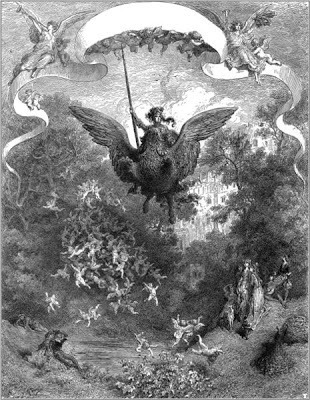
I
decided to follow up on that possibility and read the epic poem Orlando
furioso since it was the first time in literature a hippogriff was used as a
character. I doubt that I would
ever have read Orlando furioso had I
not participated in the online Harry Potter fandom debates.
I
had no real expectations when I began reading this classic, but largely
forgotten poem. I discovered a
sprawling tale with an immense cast of characters and multiple interweaving plotlines. Think of it as a medieval fantasy of
swords and sorcery set against a backdrop of a holy war between Muslim and
Christian forces in the time of Charlemagne. The poet engaged his audience with one intense duel between
famed warriors and then stopped at an exciting part to then pick up where he
left off on a different storyline that had been previously paused with
something like, "Let us leave Rinaldo and Gradasso's fight here and go
back to Orlando who when we last saw him was battling..."
My
first attempt at reading this poem was using a public domain version that can be
found online for free and translated by William Stewart Rose. I found the nineteenth century language
to be stiff and difficult to follow.
That's being kind, I found it confusing and I became easily lost. I found the story much easier to
understand once I got my hands on the Penguin Classics version translated by
Barbara Reynolds.
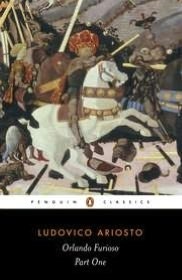
Reading
her translation, I became immersed in a Medieval world of knights. I was captivated by the love story of
the kick-ass heroine Bradamante and the virtuous knight Ruggiero. I skimmed storylines featuring other
characters and anxiously awaited the return of the Bradamante and Ruggiero
plotline.
My
original intent of reading Orlando
furioso was to see the usage of the hippogriff in context and I recognized that
this mythical creature symbolized the impossible love between Bradamante and
Ruggiero.
Bradamante
is the niece of Charlemagne and Ruggiero is a Saracen warrior descended from
Hector of Troy. They are both
respected warriors, but theirs is an impossible love since they sworn to serve
opposing leaders in the midst of a holy war.
Hippogriffs
are the personification of impossible love. The first mention of a hippogriff dates back to Virgil'sEclogues where it is mentioned in a few lines in the eighth eclogue:
"soon shall we see mate
Griffins with mares, and in the coming age
Shy deer and hounds together come to drink."
Here is the pertinent background legend: Griffins were known as fierce protectors of gold and
avengers of evil. The legendary
one-eyed Arimaspi rode on horseback while raiding gold guarded by griffins
which was the source of the long standing enmity between griffins and horses. Hippogriffs are the offspring of the
impossible love between griffins and mares.
Bradamante is a fierce warrior maid who has the difficult task of
maintaining her reputation and honor while at the same time rescuing her
beloved who is being held prisoner.
That's right, the maiden rescues a knight who is locked away in a
castle.
I loved that reversal in plot conventions and was impressed that
literature included such a powerful female character. That this story featuring such a strong female was written
centuries ago by a man impressed me even more.
There were many powerful obstacles to Bradamante and Ruggiero's
ultimate union. I remember being
overcome by emotion when I read one of the ending passages of this poem where
Ruggiero was willing to die out of love for Bradamante. I was reading this on my lunch break,
and crying on the patio.
Upon
finishing the story, I wondered why I had never heard of Bradamante and
Ruggiero before. I felt this
literary couple deserved to be as well known as Tristan and Isolde or Arthur
and Guinevere.
After
publication of Harry Potter and the
Half-Blood Prince, and the online interview that dispelled all doubt as to
JKR's planned romantic pairings, I was disinterested in continuing my same
level of active participation with the HP fandom. I needed a new writing project and it was then that I
remembered my desire to see the Bradamante/Ruggiero love story reach a larger
audience and became inspired to adapt this classic work. That was the
genesis for the writing of my novel.
I began reading extensively about Medieval
history and Charlemagne. To
further my research, I traveled to France to see the settings of my story and
discovered real life magic in the Midi Pyrenees region. I scoured many museums,
trekked hilltop villages and castle ruins. My novel became infused with detail that I could only learn
from being there in person.
Quest of the Warrior Maiden is the first book in the Bradamante and
Ruggiero two volume series. So for
those who enjoy epic historic fantasy, please consider reading this saga of
chivalry, secret romances, betrayal, revenge and magic.
http://lcmccabe.blogspot.com/2012/11/...

Published on November 09, 2012 13:25
October 20, 2012
Lance Armstrong is without honor
Lance Armstrong is a man without honor.
I used to be a fan of his. I remember my husband saying something about the Texan being someone to watch in the 1996 Olympic games and then a month later hearing of the dreaded diagnosis that Lance had testicular cancer.
It seemed to be a death sentence.
Then somehow miraculously he not only survived, but he was able to return to his sport and excel. Except he didn't just excel, he became the best of the best.
His personal story was one of triumph over adversity. It was heartwarming and inspiring.
My whole family rooted for him. We watched as many days of the Tour de France as possible. This was before I started my novel based in France. I started understanding some of France's varied geography due to the telecasts of the Tour.
I also learned about the various personalities of the riders and developed an understanding of how the sport worked. The politics of the peleton. The concept of chivalry in the sport.
For years there had been accusations swirling about him. Accusations of cheating. I gave him the benefit of the doubt.
Now after a release of a thousand pages of evidence against Lance
Armstrong with twenty-six witnesses including eleven former teammates, I
no longer have any doubts about Armstrong's guilt.
One of the reasons why I clung so long to the hope that Lance was telling us the truth is because I read his bestselling book, It's Not About the Bike written with Sally Jenkins. It was inspiring, but it was also BASED ON A LIE.
The book details his battle with cancer and his struggle to return to the sport. He also specifically mentions synthetic erythropoeitin or EPO in his book. It was because he specifically mentioned EPO in two contexts that I gave him the benefit of the doubt for so long.
and
Those were smooth calculated lies, designed to deflect any suspicion from his meteoric rise in ability. In the book he also detailed how due to the cancer treatments that he lost weight. A lot of weight. This he claimed actually helped him as a rider in the mountain stages and not have to pull up so much body weight on his bike. He was known to be scrupulous about his caloric intake to the point of weighing his food.
I believed his lies.
I believed it when he said that he was clean and that rumors and suspicions surrounding him were out of jealousy. I also believed that accusations by former team mates (like Floyd Landis) were personal vendettas.
I knew that Lance Armstrong's personality was arrogant. That came across pretty strong in the book, but I understand in order to compete on the level of a world class athlete it is almost mandatory to have arrogance in your DNA. I accepted Lance's arrogance as being a part of the overall package of a champion. He was an exciting athlete who outperformed his peers and had an amazing life story. He also appeared to be dedicating a good portion of his life and energy to helping people with cancer.
I wore his yellow bracelet. I, along with most people, have had friends and family be diagnosed and die of cancer. It seemed that by supporting the Livestrong Foundation I was helping my loved ones to "live strong."
Now I wonder how much the foundation was due to Lance's benevolence as a cancer survivor and how much of it was calculated to serve as a shield from scrutiny. It helped raise his profile as a celebrity.
Outside of hard core cycling fans, it is hard to think that many average people on the street would be able to identify the names of many professional cyclists. Lance Armstrong has the highest name recognition and is even recognizable to people by sight. How many other cyclists can claim that?
Lance's first wife Kristen also wrote a book for children. I read it to my son when he was little. He was inspired by that story as well. He looked up to Lance and believed the lies.
Now Nike and other sponsors have dropped their endorsement contracts with Lance Armstrong.
The aspect of this scandal that bothers me the most is how Lance treated his former team mates who dared tell the truth. He protected his reputation by engaging in character assassination. He declared them to be "vengeful malcontents" and "serial liars."
Instead, as it turns out, he was the mastermind of the most sophisticated, professionalized and successful doping ring in cycling history.
His book It's Not About the Bike should be shelved along with other memoirs with embellishments like James Frey's A Million Little Pieces and or even wildly inventive tales such as Misha Defonseca's Misha: A Memoire of the Holocaust Years which detailed a story of a Holocaust survivor being raised by wolves.
The concept of honor is important to me. Writing a novel set in the Medieval period where knights either follow or violate the rules chivalry has honed my own sense of what being honorable means.
My hero, the knight Ruggiero, strives to live up to the image of the perfect knight exemplified by his noble ancestor Hector of Troy. At one point, Ruggiero is engaged in a fight against three other knights. Being outnumbered does not intimidate him, because he believes in his skill. It is when the shield he is using brings about magical intervention and fells all of his opponents, he feels shame.
He won without honor.
Rather than be grateful for the win and feel this magical weapon he possesses can make him invincible, he wants to rid himself of it. He ties rocks to the shield and throws it into a deep well hoping that it will be lost for all time.
He feels that winning without honor is beneath the dignity of a knight.
That is exactly how I see how Lance Armstrong won his titles: without honor.
He is worthy of all the public shaming that he is enduring right now. He lied to people. He engaged in personal attacks against people in order to cover his lies. He also used cancer patients as a moral smokescreen to deflect against his own personal shortcomings.
Now there are accusations that he may have engaged in bribing other riders to allow him to win races.
It seems that he has not yet hit bottom with his fall from public grace.
Perhaps the dictionary definition of hubris should list Lance Armstrong as an example.
Hubris: an excess of ambition, pride, etc, ultimately causing the transgressor's ruin
May professional cycling find some worthy men to restore its honor.


I used to be a fan of his. I remember my husband saying something about the Texan being someone to watch in the 1996 Olympic games and then a month later hearing of the dreaded diagnosis that Lance had testicular cancer.
It seemed to be a death sentence.
Then somehow miraculously he not only survived, but he was able to return to his sport and excel. Except he didn't just excel, he became the best of the best.
His personal story was one of triumph over adversity. It was heartwarming and inspiring.
My whole family rooted for him. We watched as many days of the Tour de France as possible. This was before I started my novel based in France. I started understanding some of France's varied geography due to the telecasts of the Tour.
I also learned about the various personalities of the riders and developed an understanding of how the sport worked. The politics of the peleton. The concept of chivalry in the sport.
For years there had been accusations swirling about him. Accusations of cheating. I gave him the benefit of the doubt.
Now after a release of a thousand pages of evidence against Lance
Armstrong with twenty-six witnesses including eleven former teammates, I
no longer have any doubts about Armstrong's guilt.
One of the reasons why I clung so long to the hope that Lance was telling us the truth is because I read his bestselling book, It's Not About the Bike written with Sally Jenkins. It was inspiring, but it was also BASED ON A LIE.
The book details his battle with cancer and his struggle to return to the sport. He also specifically mentions synthetic erythropoeitin or EPO in his book. It was because he specifically mentioned EPO in two contexts that I gave him the benefit of the doubt for so long.
"I was given a red blood cell booster called Epogen (EPO). In any other situation, taking EPO would get me in trouble with the International Cycling Union and the International Olympic Committee, because it's considered performance-enhancing. But in my case, the EPO was hardly that. It was the only thing that kept me alive."
and
I decided to address the charges outright, and held a press conference in Saint-Gaudens. "I have been on my deathbed, and I am not stupid," I said. Everyone knows that use of EPO and steroids by healthy people can cause blood disorders and strokes. What's more, I told the press, it wasn't so shocking that I won Sestriere; I was an established former world champion.
"I can emphatically say I am not on drugs," I said. "I thought a rider with my history and my health situation wouldn't be such a surprise. I'm not a new rider. I know there's been looking, and prying, and digging, but you're not going to find anything. There's nothing to find...and once everyone has done their due diligence and realizes they have to be professional and can't print a lot of crap, they'll realize they're dealing with a clean guy."
Those were smooth calculated lies, designed to deflect any suspicion from his meteoric rise in ability. In the book he also detailed how due to the cancer treatments that he lost weight. A lot of weight. This he claimed actually helped him as a rider in the mountain stages and not have to pull up so much body weight on his bike. He was known to be scrupulous about his caloric intake to the point of weighing his food.
I believed his lies.
I believed it when he said that he was clean and that rumors and suspicions surrounding him were out of jealousy. I also believed that accusations by former team mates (like Floyd Landis) were personal vendettas.
I knew that Lance Armstrong's personality was arrogant. That came across pretty strong in the book, but I understand in order to compete on the level of a world class athlete it is almost mandatory to have arrogance in your DNA. I accepted Lance's arrogance as being a part of the overall package of a champion. He was an exciting athlete who outperformed his peers and had an amazing life story. He also appeared to be dedicating a good portion of his life and energy to helping people with cancer.
I wore his yellow bracelet. I, along with most people, have had friends and family be diagnosed and die of cancer. It seemed that by supporting the Livestrong Foundation I was helping my loved ones to "live strong."
Now I wonder how much the foundation was due to Lance's benevolence as a cancer survivor and how much of it was calculated to serve as a shield from scrutiny. It helped raise his profile as a celebrity.
Outside of hard core cycling fans, it is hard to think that many average people on the street would be able to identify the names of many professional cyclists. Lance Armstrong has the highest name recognition and is even recognizable to people by sight. How many other cyclists can claim that?
Lance's first wife Kristen also wrote a book for children. I read it to my son when he was little. He was inspired by that story as well. He looked up to Lance and believed the lies.
Now Nike and other sponsors have dropped their endorsement contracts with Lance Armstrong.
The aspect of this scandal that bothers me the most is how Lance treated his former team mates who dared tell the truth. He protected his reputation by engaging in character assassination. He declared them to be "vengeful malcontents" and "serial liars."
Instead, as it turns out, he was the mastermind of the most sophisticated, professionalized and successful doping ring in cycling history.
His book It's Not About the Bike should be shelved along with other memoirs with embellishments like James Frey's A Million Little Pieces and or even wildly inventive tales such as Misha Defonseca's Misha: A Memoire of the Holocaust Years which detailed a story of a Holocaust survivor being raised by wolves.
The concept of honor is important to me. Writing a novel set in the Medieval period where knights either follow or violate the rules chivalry has honed my own sense of what being honorable means.
My hero, the knight Ruggiero, strives to live up to the image of the perfect knight exemplified by his noble ancestor Hector of Troy. At one point, Ruggiero is engaged in a fight against three other knights. Being outnumbered does not intimidate him, because he believes in his skill. It is when the shield he is using brings about magical intervention and fells all of his opponents, he feels shame.
He won without honor.
Rather than be grateful for the win and feel this magical weapon he possesses can make him invincible, he wants to rid himself of it. He ties rocks to the shield and throws it into a deep well hoping that it will be lost for all time.
He feels that winning without honor is beneath the dignity of a knight.
That is exactly how I see how Lance Armstrong won his titles: without honor.
He is worthy of all the public shaming that he is enduring right now. He lied to people. He engaged in personal attacks against people in order to cover his lies. He also used cancer patients as a moral smokescreen to deflect against his own personal shortcomings.
Now there are accusations that he may have engaged in bribing other riders to allow him to win races.
It seems that he has not yet hit bottom with his fall from public grace.
Perhaps the dictionary definition of hubris should list Lance Armstrong as an example.
Hubris: an excess of ambition, pride, etc, ultimately causing the transgressor's ruin
May professional cycling find some worthy men to restore its honor.

Published on October 20, 2012 06:46
June 19, 2012
Podcast recording of interview of Sonoma Squares Murder Mystery writers
In a previous post I mentioned that I was going to be a guest on Gil Mansergh's radio show "Word by Word" broadcast on public radio KRCB.
The show featured four different writers who participated in the serialized murder mystery set in Sonoma County and published online and in the print edition of Santa Rosa's Press Democrat newspaper.
The podcast of that recording is now available online for those interested in hearing the interview, but may have missed it. The writers in the interview were Ana Manwaring, Chris Coursey and Robert Digitale.
The series itself has finished so those who prefer reading things in their entirety can find it all online here.
It was a fun literary project and one that I hope Robert Digitale might consider doing again.
http://lcmccabe.blogspot.com/2012/06/...


The show featured four different writers who participated in the serialized murder mystery set in Sonoma County and published online and in the print edition of Santa Rosa's Press Democrat newspaper.
The podcast of that recording is now available online for those interested in hearing the interview, but may have missed it. The writers in the interview were Ana Manwaring, Chris Coursey and Robert Digitale.
The series itself has finished so those who prefer reading things in their entirety can find it all online here.
It was a fun literary project and one that I hope Robert Digitale might consider doing again.
http://lcmccabe.blogspot.com/2012/06/...

Published on June 19, 2012 08:28



